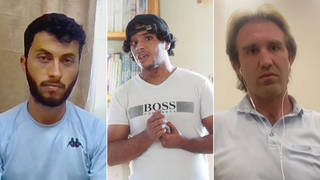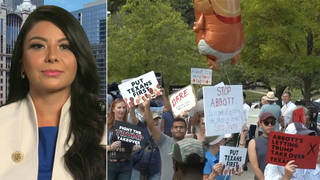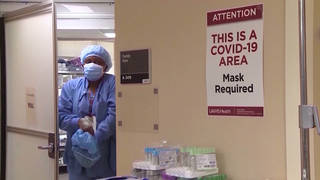
Guests
- Mona Hanna-Attishapediatrician, professor at Michigan State University College of Human Medicine in Flint and director of the Pediatric Public Health Initiative.
The Biden administration is launching a national vaccination campaign for about 28 million children between the ages of 5 and 11. The vaccine will be two doses and one-third as potent as the one being given to people over the age of 12. An independent panel is set to offer a recommendation to the FDA that evaluates the safety and efficacy of the vaccines in late October. We’re joined by Dr. Mona Hanna-Attisha, pediatrician and co-chair of the Protect Michigan Commission, to speak more about the rollout of the vaccine for kids. “It’s really important, if we want to go back to normal, for our kids to get this vaccine,” says Dr. Hanna-Attisha. “We need all hands on deck to improve our vaccination rates.”
Transcript
AMY GOODMAN: You’re a pediatrician in Michigan and co-chair of the Protect Michigan Commission, and I wanted to ask you about vaccines for children, as well as the pandemic in Michigan. While much of the country is seeing a drop in coronavirus cases and hospitalizations, the pandemic has continued to worsen in Michigan, with the highest rates of infection reportedly among 10-to-19-year-olds. This comes as the Biden administration is launching a national vaccination campaign for about 28 million children between the ages of 5 and 11. Pfizer’s COVID vaccine is already being given to children as young as 12 in the U.S., and the company says a two-dose vaccine that’s one-third as potent as the original vaccine is safe and effective for younger kids. This is President Biden speaking last week.
PRESIDENT JOE BIDEN: We have purchased enough vaccines for all children between the ages of 5 and 11 in the United States. And it will be convenient for parents to get their children vaccinated at trusted locations. And families will be able to sleep easier at night knowing their kids are protected, as well.
AMY GOODMAN: Dr. Mona Hanna-Attisha, this comes as Michigan has seen low vaccination rates since vaccines were made widely available for adults about 10 months ago. Now Michigan is seeing more than 3,500 new coronavirus cases a day, three times the daily average of a year ago. Last year, armed militants attacked the Michigan Capitol, threatened to kidnap Governor Gretchen Whitmer in a plot that stemmed from restrictions she put in place to protect Michigan residents from the coronavirus. Just last month, she reached a budget deal with state lawmakers that includes language that would prevent her from implementing COVID-19 vaccine mandates and mask rules for K-12 students. Can you talk about the situation in Michigan?
DR. MONA HANNA-ATTISHA: Yeah. So, you know, as the rest of the country is starting to see a decrease from the Delta variant, Michigan is now starting to see that surge from Delta. As we know, Delta is more contagious, and now it is this unvaccinated population, largely unvaccinated, of young children and young adults that are increasing in cases. It’s frustrating in Michigan. The governor’s hands are largely tied because of the restrictions from both the Michigan Supreme Court and the Michigan Legislature. It’s hard, and I continue to be in disbelief. And there’s so many resonance here to the Flint story. Like, why wouldn’t you want to protect people? Like, why would you want to tie the arms of public health? This is a moment where we need good governance. We need leaders to do the hard things and to be driven by science. And unfortunately, there’s so much opposition.
You know, Amy, just, like, our public health leaders are under attack. And, you know, my inbox is often filled with anti-science messages from the times of Flint, but now also with kind of the mask — anti-mask movement and the anti-vaccine movement. And now those messages are filled with vitriol. They include racist messages and sexist messages. So it is very difficult to be a public health leader right now. But as a pediatrician, we are super excited about the imminent authorization of the vaccine for younger children.
AMY GOODMAN: So, let’s talk about masks and vaccines. K-12 schools without mask mandates in Michigan saw 62% more coronavirus spread. Now you have the possibility that children can be vaccinated. Can you just, for the science of it and for people who are deeply concerned about vaccines, explain why you think that children being vaccinated is critical to stemming this pandemic?
DR. MONA HANNA-ATTISHA: Absolutely. And I cannot wait for those conversations, that we have already been having in our exam rooms. As pediatricians, all we do is give vaccines. This is bread and butter of what we do every single day. And I want moms and dads to come into the office with questions. And we talk science. We talk about the safety, and we talk about the efficacy, specifically of the COVID vaccine. And this is an amazing vaccine. It works really, really well, better than so many other vaccines that we have. And it, most importantly, protects from serious illness, and it protects from death. So we have those conversations, and we answer questions. And once again, families have questions, as they should. I don’t want them to blindly trust what I want, what I have to say. I want that trust to continue to be built in those one-on-one conversations. And we might not convince them at that first visit, but we might at the second visit, and we might at the third visit.
So, I talk about the science. I talk about how the benefits greatly outweigh any potential risks. And what I often do in those exam visits is I also share that I trust this vaccine so much that my own children have gotten this vaccine. So, my kiddos are in the 12-to-15 age group, and the very first day it was authorized for that age group, I had them on live TV getting their vaccine. I mean, I don’t think we should all be using our children to help people get protected, but my kids wanted — this is the first vaccine, the first shot, that they were begging for, because they want to go back to normal. They want to go back to school. They don’t want to be quarantined. They want to be children. And our children, you know, even though we haven’t had many deaths, they have lost so much. They have lost parents. They have lost time in education. There’s been a huge impact on mental health. So it’s really important, if we want to go back to normal, for our kids to get this vaccine.
AMY GOODMAN: I’m looking at a piece in The Guardian, which says, “To help states and cities prepare, the [CDC] sent out a seven-page document with guidance on how to set up expanded vaccination programs. It notes [that] pharmacies in every state can give [COVID] shots to children, but that only doses prepared and packaged specifically for children are to be used for those under 12.” Explain the importance of that, Dr. Mona.
DR. MONA HANNA-ATTISHA: Yeah. So, the dosing is smaller than the regular dose of the Pfizer vaccine. There’s also different storage issues and the number of vials. So, you know, I strongly believe, and the American Academy of Pediatrics strongly believes, that kids should go to their medical home, which is their regular doctor, to get the vaccine, because once again, we have a trusted relationship. We are finding that the role of trust is huge in COVID and in people’s acceptance of this vaccine, so going to the place where you usually go to get vaccines, getting your questions answered, and having it prepared in a place specifically, once again, where they know what to do with childhood vaccines.
AMY GOODMAN: Advocates also calling for the government to do more to address racial disparities and obstacles that might emerge in vaccinating younger children — for example, kids may not get shots if parents can’t get off work.
DR. MONA HANNA-ATTISHA: Yeah, we absolutely have to address those barriers. You know, there’s those who are vaccine hesitant, and there’s those who are vaccine resistant. And we can have — you know, we can work to address the vaccine hesitancy by overcoming those barriers, which in medicine we often call the social determinants of health, addressing things like child care and missing work and having evening hours and getting transportation. We need all hands on deck to improve our vaccination rates, and it includes addressing all these other barriers to healthcare.
AMY GOODMAN: Well, Dr. Mona Hanna-Attisha, I want to thank you for being with us, pediatrician based in Flint. Her 2015 study revealed Flint’s children had high levels of lead in their blood. She’s a Michigan State University professor, co-chair of the Protect Michigan Commission. She’s also author of What the Eyes Don’t See: A Story of Crisis, Resistance, and Hope in an American City.
Also, to see our coverage of the Flint water crisis, you can go to democracynow.org to check out our documentary Thirsty for Democracy: The Poisoning of an American City.
Next up, we look at the escalating tension between the United States, China and Taiwan. Stay with us.













Media Options